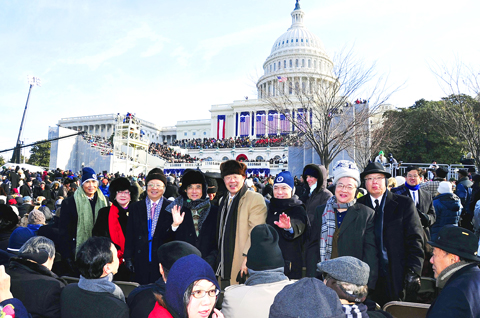The financial crisis will have a significant influence on US President Barack Obama’s position on both China and Taiwan, and it will take months before the state of Taiwan-US relations under the new administration becomes clear, academics said yesterday.
At a forum in Taipei, Edward Chen (陳一新), professor at Tamkang University’s Institute of American Studies, said US sales of high-tech weapons to Taiwan might be shelved to appease China, which, as an economic heavyweight, could play a key role in reversing the global downturn.
Taiwan’s national security authorities should brace for tough challenges ahead in seeking to buy US arms and will need to pursue creative strategies that appeal to both the US and China in terms of military collaboration, Chen told the forum sponsored by the Taiwan Thinktank.

PHOTO: CNA
Beijing has long protested US arms sales to Taiwan. At a presentation of its 2008 national defense policy paper, the Chinese Defense Ministry said on Tuesday that “China is resolutely against the US sales of weapons to Taiwan.”
The Obama administration has not announced a new director for the American Institute in Taiwan or a new ambassador to China, but Richard Bush, who served as AIT Washington chairman under the administration of president Bill Clinton, has reportedly been tapped to take over the Taipei office later this year.
The academics at yesterday’s forum agreed that a paradigm shift was likely in US foreign policy, from pre-emptive action on crises under the administration of former president George W. Bush to strategies that seek to prevent problems from arising. However, US strategy in the Asia-Pacific region should go largely unchanged, they said.
“Washington will continue to keep a strong military presence and strive to fortify its relations with the countries in the region. One of the issues the US is very concerned about is the real motive and ultimate goal behind China’s rapid military build-up in recent years,” said Chen Wen-hsien (陳文賢), a National Chengchi University history professor.
He said Obama’s team was keenly aware of the delicate situation between China, Taiwan and the US and understood that any changes to relations must be predicated on the “one China” policy, the three Sino-US communiques and the Taiwan Relations Act.
Taiwan’s democracy is the key buttress in Taiwan-US ties, he said, because it is the biggest marker that sets Taiwan apart from China.
Obama appears more willing to listen to differing opinions on a given issue than the previous administration, he said, adding that the new president’s policies were difficult to predict at this point.
“We don’t know what kind of policy he will pursue in terms of ties with China: whether it will be a policy of engagement, containment or hedging,” said Loh Chih-cheng (羅致政), a professor of political science at Soochow University.

The High Prosecutors’ Office yesterday withdrew an appeal against the acquittal of a former bank manager 22 years after his death, marking Taiwan’s first instance of prosecutors rendering posthumous justice to a wrongfully convicted defendant. Chu Ching-en (諸慶恩) — formerly a manager at the Taipei branch of BNP Paribas — was in 1999 accused by Weng Mao-chung (翁茂鍾), then-president of Chia Her Industrial Co, of forging a request for a fixed deposit of US$10 million by I-Hwa Industrial Co, a subsidiary of Chia Her, which was used as collateral. Chu was ruled not guilty in the first trial, but was found guilty

DEADLOCK: As the commission is unable to forum a quorum to review license renewal applications, the channel operators are not at fault and can air past their license date The National Communications Commission (NCC) yesterday said that the Public Television Service (PTS) and 36 other television and radio broadcasters could continue airing, despite the commission’s inability to meet a quorum to review their license renewal applications. The licenses of PTS and the other channels are set to expire between this month and June. The National Communications Commission Organization Act (國家通訊傳播委員會組織法) stipulates that the commission must meet the mandated quorum of four to hold a valid meeting. The seven-member commission currently has only three commissioners. “We have informed the channel operators of the progress we have made in reviewing their license renewal applications, and

‘DENIAL DEFENSE’: The US would increase its military presence with uncrewed ships, and submarines, while boosting defense in the Indo-Pacific, a Pete Hegseth memo said The US is reorienting its military strategy to focus primarily on deterring a potential Chinese invasion of Taiwan, a memo signed by US Secretary of Defense Pete Hegseth showed. The memo also called on Taiwan to increase its defense spending. The document, known as the “Interim National Defense Strategic Guidance,” was distributed this month and detailed the national defense plans of US President Donald Trump’s administration, an article in the Washington Post said on Saturday. It outlines how the US can prepare for a potential war with China and defend itself from threats in the “near abroad,” including Greenland and the Panama

Taiwan People’s Party (TPP) Chairman Huang Kuo-chang (黃國昌) yesterday appealed to the authorities to release former Taipei mayor Ko Wen-je (柯文哲) from pretrial detention amid conflicting reports about his health. The TPP at a news conference on Thursday said that Ko should be released to a hospital for treatment, adding that he has blood in his urine and had spells of pain and nausea followed by vomiting over the past three months. Hsieh Yen-yau (謝炎堯), a retired professor of internal medicine and Ko’s former teacher, said that Ko’s symptoms aligned with gallstones, kidney inflammation and potentially dangerous heart conditions. Ko, charged with